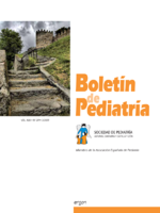Uso del Cuestionario de Capacidades y Dificultades (SDQ) como instrumento de cribado de trastornos psiquiátricos en la consulta de pediatría de Atención Primaria
D. Mata Zubillaga , Á. Suárez Rodríguez , C. Torres Hinojal , A. Carro Serrano , E. Ortega García
Bol. Pediatr. 2009; 49 (209): 259 - 262
Los trastornos de salud mental afectan a una parte importante de la población infantil. No son motivos habituales de consulta aún cuando están presentes, y el comportamiento de los pacientes es difícil de valorar dentro de su contexto sociocultural y evolutivo.Se diseñó un estudio con el fin de valorar la aplicabilidad del cuestionario SDQ como instrumento de cribado de trastornos de salud mental en una consulta de pediatría de atención primaria. Se incluyeron 108 niños pertenecientes a tres consultas distintas de la misma área sanitaria, entre los que se cumplimentó el cuestionario y se recogió información acerca de factores de riesgo. Quedaron excluidos del estudio los pacientes con diagnóstico psiquiátrico previo y/o que consultaran por este motivo. Del total de niños encuestados, 10 presentaron resultado alterado en el test (9,3%) y 9 fueron enviados para valoración al servicio de Psiquiatría Infantojuvenil. Presentaban factores de riesgo 3 pacientes. Se diagnosticó de TDAH a 3 de ellos (2,8%), ninguno con dichos factores.El cuestionario SDQ podría ser en la consulta de atención primaria un instrumento de cribado útil para sospechar trastornos mentales en la edad pediátrica y optimizar la derivación a las Unidades de Psiquiatría.
Use of Strength and Difficulties Questionnaire (SDQ) as a screening tool in psychiatric disorders in the pediatrics consultations of Primary Care
Mental health disorders affect a significant portion of the child population. Diagnosis is complex because it is difficult to assess the behavior of patients appropriately in their social context and evolving.
We designed a study to assess the SDQ questionnaire as a screening tool for disorders of mental health in a pediatric primary care consultation. We included 108 children belonging to three different consultations, which included the questionnaire and collected information about risk factors. Of these, 10 had resulted altered, and 9 were sent for psychiatric assessment at the service of children and adolescents. Five patients had risk factors. ADHD is diagnosed in 3 of them, none of these with risk factors. None of the patients had been informed or consulted the pediatrician for changes in behavior.
The questionnaire SDQ represents a useful diagnostic tool in the consultation of pediatric primary care. The screening of patients conducted with the same result of great help in identifying mental disorders, facilitating the diagnosis by the psychiatrist.
Artículo completo (PDF) (72 kb.)
- Psicología
